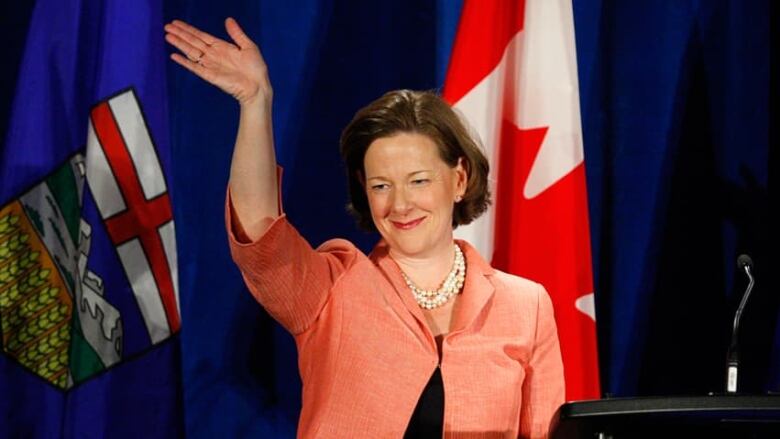Alberta election saw 'fear' win over 'anger'

If the early polls were to be believed, Alberta was in for political upheaval unlike anything the province had seen in four decades.
Once the ballots were counted, however, the political picture was pretty much the same: theProgressive Conservative dynasty is intactunder PremierAlison Redford.
Sure, Danielle Smith and the upstart Wildrose party had increased their presence in the legislature fourfoldfrom four to 17 seatsbut predictions it would form the next government fell way off the mark.
"It was a stunner. It really was," says Duane Bratt, a political science professor at Mount Royal University in Calgary. "Even the Tories I think were really surprised with what transpired."
Monday's election result caught many off guard, but observers say issues likequestionable polling and strategic voting, as well as concerns about social conservatism and controversial statements from Wildrose candidates, help explain the 61-seat PC majority.
"Fear won out over anger," Paul McLoughlin, who writes the Alberta Scan newsletter, told the CBC Radio show Calgary Eyeopener Tuesday morning, referring to "bozo eruptions" from two Wildrose candidates as well as Smiths waffling on the reasons for climate change.
Bratt says there are questions for pollsters in the wake of the results, but he suggests the election result makes a bigger statement about the nature of the province.
'Not a socially conservative province'
"I think beyond the polls, though, it showed that while Alberta may be a fiscally conservative province, it is not a socially conservative province," he said.
Pollster Bruce Cameron looked to the final week of the campaign as key to Monday's result.
"Let me clarify: I did not get it wrong," Cameron told Calgary Eyeopener, claiming he saw the PC wave coming back. "I did not measure the size of the wave. The size of the wave that broke on Monday was immense."
"Most of the pollsters that got it completely wrong were from out of this province," said Cameron, referring specifically to pollsters used by the Sun Media chain, including Montreal-based Leger Marketing and Ottawa-based Abacus Data.
"If the election had been held a week earlier, it would have been a Wildrose majority," said Cameron.
The final days of the campaign, when voters would be looking to solidify their choice, saw the emergence of controversial statements from two Wildrose candidates.
Anti-gay comments posted in a blog a year ago byEdmonton South West candidate Allan Hunspergersurfaced last week and provoked a backlash against the party.
Meanwhile,Calgary Greenway candidate Ron Leech apologizedafter suggesting in a radio interview that he would be the best choice to communicate with residents in his riding because he is white.
"In the last week and a half, the whole issue of social conservatism and the issue of trying to represent an entire population when one has either intolerant or even bigoted views became quite an issue," says Lori Williams, an associate professor of policy studies at Mount Royal University.
Wildrose leader Danielle Smith said the candidates were entitled to speak their minds, and Williams says it is "absolutely appropriate" to defend freedom of speech.
"But when you are running to represent an entire riding or province, and you are speaking in ways that suggest insensitivity at best or intolerance or bigotry at worst, that you're proposing, as in the case of one of the candidates, that the public education system should not teach that it's wrong to bully gays, you're not going to get support in a province like Alberta," Williams says.
Strategic voting a factor
Strategic voting may have also come into play, with people in some cases choosing to vote against the Wildrose party rather than for a particular party.
"A lot of people said they were voting as they never imagined they would," says Williams.
"Some of them were Progressive Conservative that weren't voting Progressive Conservative. Some of them wereLiberalsand NDP voters who were moving their vote to the Conservatives.
Some described it as holding their nose and voting for the Conservatives despite their disagreement with some of the record or their policies."
Bratt says there's a need for some number-crunching to determine the potential impact of strategic voting, something both he and Williams see at play in Calgary, but not in Edmonton.
Some polls suggested the number of undecided voters actually rose in the final days of the campaign. Bratt says he thinks the undecided voters clearly swung to the Conservatives.
Cameron cast some doubt on the accuracy of online polling and the automated phone-polling strategy known as interactive voice response (IVR).
"If you do those IVR calls, you press one for Danielle Smith and two for Alison Redford. Theyre very inexpensive, you can do a thousand or two thousand a night," Cameron said.
"If you actually use that technology, and use a simple question, its not as accurate as [personally] phoning."
As for online polls that predicted a Wildrose win, Cameron said, "The online [pollsters] are going to have to ask, How deep and diverse were their panels?"
With files from Andre Mayer and Andy Pinsent












_(720p).jpg)


 OFFICIAL HD MUSIC VIDEO.jpg)
.jpg)



























































































